FOSIL and the Extended Project Qualification (EPQ) [Closed. Use Extended and Higher Project Quliafications Topic]
Home › Forums › Inquiry and resource design › FOSIL and the Extended Project Qualification (EPQ) [Closed. Use Extended and Higher Project Quliafications Topic]
Tagged: EPQ, Extended Essay, HPQ, Questionnaires, Surveys
- This topic has 17 replies, 8 voices, and was last updated 1 year, 5 months ago by
 Jenny Toerien.
Jenny Toerien.
-
AuthorPosts
-
6th May 2019 at 4:21 pm #1244
Although we have been using FOSIL to enhance our support for the International Baccalaureate (IB) Diploma Programme (DP) Extended Essay (EE) since 2012, it is only since the appointment of Chris Foster to the position of Head of Student Research in 2018 that support for the EPQ has begun to benefit from these FOSIL-based interventions and resources.
Chris should be able to elaborate on where we are with EPQs shortly.
20th June 2019 at 7:38 pm #1594As Darryl suggests, FOSIL has helped us to better support the EPQ at Oakham. In particular, engaging with FOSIL has:
- enabled us to understand the EPQ process in terms of stages in an inquiry cycle,
- made it easier to develop and adapt resources that help pupils through the difficult stages of the inquiry process, and
- think about the EPQ assessment criteria and how we can better provide evidence that shows how the pupils have engaged with the process of carrying out a project.
I’ve attached an EPQ assessment framework to this post. I produced it to help me think about what resources might support the pupils and how we can use them as evidence for their engagement in the inquiry process. The framework lists the resources we use, and links the assessment statements to the FOSIL stage they fall into. The FOSIL resources are marked with an ‘F’ in the framework.
I’ve based the framework on the AQA assessment criteria, but I hope that it might be useful for those of you who are supporting pupils through EPQs with other exam boards. The Investigative Journal and CRAAP Testing Rubric have really helped pupils think about how they select and use information.
I’ll add more resources as I produce them. At the moment, I’m working on a reflection aid to help with the summary and reflection pages of the production log.
I’d be very interested in hearing what other forum members use to support the EPQ in their schools.
Attachments:
26th June 2019 at 7:48 pm #1622For me, the FOSIL tool that has made the most difference to the quality of EPQ research at Oakham has been the investigative journal. For this reason, I thought I would share with the forum a couple of examples of the investigative journal in use. These examples are interesting because they show how how FOSIL tools can be used to support pupils in the trickier stages of an inquiry. The journal is suitable for all abilities. It scaffolds the process of constructing understanding from a source of information. The pupil who produced these was very able, and her journal shows just how deeply she engaged with the sources she selected. Frustratingly, she hasn’t included page numbers in her citation, although these were used in her final essay. She used the referencing tools in Word to produce a bibliography which followed APA 6th Edition (our preferred ‘in-house’ style) at the end of her journal.
What’s also worth noting is that these examples show an earlier draft of the investigative journal than the one we currently use. It shows how our thinking has developed. To make the inquiry process more visible, later drafts of the journal use the FOSIL colour scheme and the icons bottom left to indicate the stages of the inquiry process it draws upon. The right hand box has been simplified and a CRAAP testing prompt added to our current draft, which can be found on the resources pages.
Do post if you have any questions about use of the investigative journal or suggestions for improvements.
Attachments:
25th March 2020 at 4:39 pm #4280Last year I managed to embed myself more into the delivery of the EPQ with two Library-based sessions. In the first I focused on how to approach research by identifying areas of investigation, effectively combining keywords in search engines and critically judging the quality of source using the CRAAP test. The second session looked at how the literature review fits within the EPQ and Harvard referencing.
Having to adapt my session to online-only delivery this week it occurred to me how I was already partially following the FOSIL cycle. I have just spent a happy couple of days developing my first session to be more in-line with CONNECT, WONDER AND INVESTIGATE and finding materials from the resources collection here to adapt, namely the Focussing Your Topic sheets and the CRAAP test rubric.
Thinking ahead to the second session I have picked out the investigation journal and the sheet on drawing conclusions from multiple perspectives which are far better designed than anything I had before!
Thank you for these resources! I feel that I am now following something much more structured and in-line with a generally accepted way of teaching these skills.
31st March 2020 at 10:24 am #4283I need to create a lesson on questionnaire design for our HPQ & EPQ students, does anyone have any ideas for this – I am thinking of using a poor questionnaire for them to analyse with ways to ask questions to achieve maximum results? Thank you
2nd April 2020 at 11:43 am #4288Very interesting question, Sara.
I will alert Chris Foster – Head of Student Research at Oakham School with responsibility for EPQ’s – to your question. He is also in the process of finishing off his PhD, which relied heavily on questionnaires, so he should have some thoughts on questionnaire design 🙂
I will also mention it Jenny Toerien – Curriculum Librarian for Upper School at Oakham School – as she is a Mathematics graduate and has been of enormous help to me in this regard.
I will also flag your question with the community more widely.
Darryl
3rd April 2020 at 12:42 pm #4304Thank you – I look forward to hearing ideas. Sara
7th April 2020 at 12:01 am #4306Hi Sara. Thank you for the really important question, and sorry for the delay in getting back to you. I had been thinking that I needed to add something on questionnaire design to our (very new and still developing) Extended Essay LibGuide, but it would be even better to be able to offer a lesson on it. Next year I would love to add an optional session during our February EE Investigation week for all those planning to use questionnaires, so am very keen to hear feedback from your session when you deliver it. [Note: the LibGuides are new this year so are still in the process of being written as we work through the IB Extended Essay process with the students. Most of the guidance beyond the initial subject selection is in the individual subject-specific guides e.g. IB English A ]
How long is the lesson likely to be? Is it for EPQ and HPQ students together, or two separate lessons? What stage in the process will they be at (i.e. do they already have a good idea of their area of interest? Could they come out of the lesson having made some practical decisions about their own questionnaires?). It also depends on the group size and level of interaction you are able to have. Are you doing this online during the lockdown, or planning something for afterwards?
Frustratingly we have a couple of really good books on questionnaire design, which are currently under coronavirus lockdown at school. However, it seems that there are two key angles to address:
1. The background to writing the questionnaire:
- What information are you trying to find?
- Who do you need answers from? (what is your target population?)
- Ethical considerations
- How are you going to administer the questionnaire? (paper, interview, online – what are the options and tools available? The online tools are important to explore before students get started. I had a student come to me during our EE investigation week in February who had designed a SurveyMonkey survey and only discovered once she had finished that she was only allowed 10 questions on a free account, but she needed more. Like many schools, however, we use Office 365 and Forms would allow her up to 100 questions, so she had to remake her questionnaire in Forms. This is my first year in this particular role in the school and this was a lesson to me that we need to address this earlier.)
- The vital role of a small pilot study to check it works the way you think it does!
2. The questions themselves:
- Open vs closed. Important to think about what you want to do with the data – open questions can produce some very interesting answers that you wouldn’t otherwise have considered, but are very difficult to analyse, particularly with larger sample sizes. Closed questions are good for quantitative analysis, but do (sometimes artificially) restrict the answers you get.
- Bad questions: ‘Leading’, confusing and double-barrelled questions
- Scales of agreement/disagreement (lots of interesting discussion to be had about Likert scales if you have the time)
- Forced choice questions
- Keeping it short, relevant and interesting for the respondent and ordering and grouping questions appropriately.
- Explaining what it is for and levels of confidentiality
[I found these two videos from helpful in getting my brain going in the right direction: Designing a questionnaire, Writing good survey questions , but there are many others out there.]
I’m sure you know all this better than I do though – I’m just starting to think about a session for next year, and I have to think through the content I want to deliver before worrying about the format. You were actually asking for ideas for the format of the session. I think your idea of a ‘bad’ questionnaire is a good one – although perhaps it could be more nuanced and have some good and some bad questions.
How about getting students to take a short survey at the start, as a ‘lesson starter’ as they come in perhaps, or even electronically before the session using something like Forms? If you design that with some deliberately bad and good questions, you could ask them to critique the survey. Which were ‘bad’ questions? Why? How could they improve them? Which were ‘good’ ones? Why?
If they submit their answers before the session, you could look at some of the results and show which answers are difficult to analyse, and which questions produce what they might consider to be surprising results. Likert scales are quite interesting to look at for acquiescence bias and central tendency bias but you probably won’t have time for this!
It would be good for them to emerge from the session with something concrete for their inquiry if they are at a suitable stage. Perhaps you could design a form for them to fill in looking at those five background stages above in relation to their own inquiry: What? Who? How? Ethics? And Pilot (how are they going to do one?) or ask them to design one good question for their survey and test in on a partner.
One final thought, which is perhaps more challenging given the current situation – is there any opportunity to connect with subject-teaching colleagues in subjects that use questionnaires (off the top of my head Geography and DT are obvious examples) to ask what they teach about this and when, and what they would like students to know but don’t actively teach? What are common problems they see that they would like you to address? One of the advantages we have in libraries is that we can be a point of connection between subject departments and provide students with a joined up experience.
I would love to continue this conversation and to hear your thoughts and any feedback on how you get on – this is definitely something I need to develop for next year.
8th April 2020 at 8:26 am #4308Some really good thoughts here Jenny! I would just add that in the past 4 years I have seen (and completed!) some terrible surveys for EE and EPQ where it was patently obvious what they wanted the answers to be. As a result I ran a session (pretty short as we didn’t have much time – approx 20 mins) on data collection which focused on surveys/questionnaires and interviews. I invited one of our Marketing team over to talk to the pupils who were doing primary data collection and he was able to tell them that it is crucial they think about their questions before they write them. They have to spend time planning their survey design and they can’t ask leading questions or try to manipulate the field because it’s much better to analyse data where there might be anomalies and things you didn’t anticipate.
It was good to have another voice other than mine added to the research morning, especially someone who does surveys as part of his job. It would be worth looking out examples of poor surveys (if you have copies of previous years’ EPQs you will most likely come across some!) and maybe anonymise and get your students to evaluate and rate them as surveys? The Study Skills Handbook by Sheila Cottrell was my go-to resource for this – she goes into some depth on questionnaire design – but there are plenty of other resources out there. It’s not rocket science but like anything it requires careful planning – pupils have to think hard about what they want to find out and craft questions which aren’t leading and which will help them to best answer their research question.
9th March 2021 at 2:35 pm #37901We are keen to expand our EPQ support this year, using resources developed for our IBDP Extended Essay cohort. Currently Chris Foster, our Head of Student Research supervises all of our EPQ students (for us it’s a smaller cohort than for the EE) and delivers an excellent support program for them, including some crossover from the EE support, but this year Chris and I are keen to build a specific LibGuide for this group and develop a similar co-operative support relationship to the one we have for the EE. Support for the EE and the EPQ has a lot in common, so for anyone interested it might also be worth exploring the FOSIL and the IB Diploma Programme Extended Essay (EE) topic too (there are some interesting conversations going on in that Topic at the moment around the use of LibGuides vs OneNote vs a VLE, and on support for citing and referencing).
21st May 2021 at 11:00 am #55839We have recently made some progress in terms of expanding our Library support for the EPQ. Chris, our Head of Student Research, already does a great job of supporting and supervising all the EPQ students and has for many years but, compared with the IB Extended Essay, the Library has not historically provided any coordinated support. As the cohort has grown in recent years Chris and I have been discussing for some time how we could best collaborate to support the students. As a result I have put together a new EPQ LibGuide, which gives students central access to all the resources they need and guidance on the structure of an inquiry.
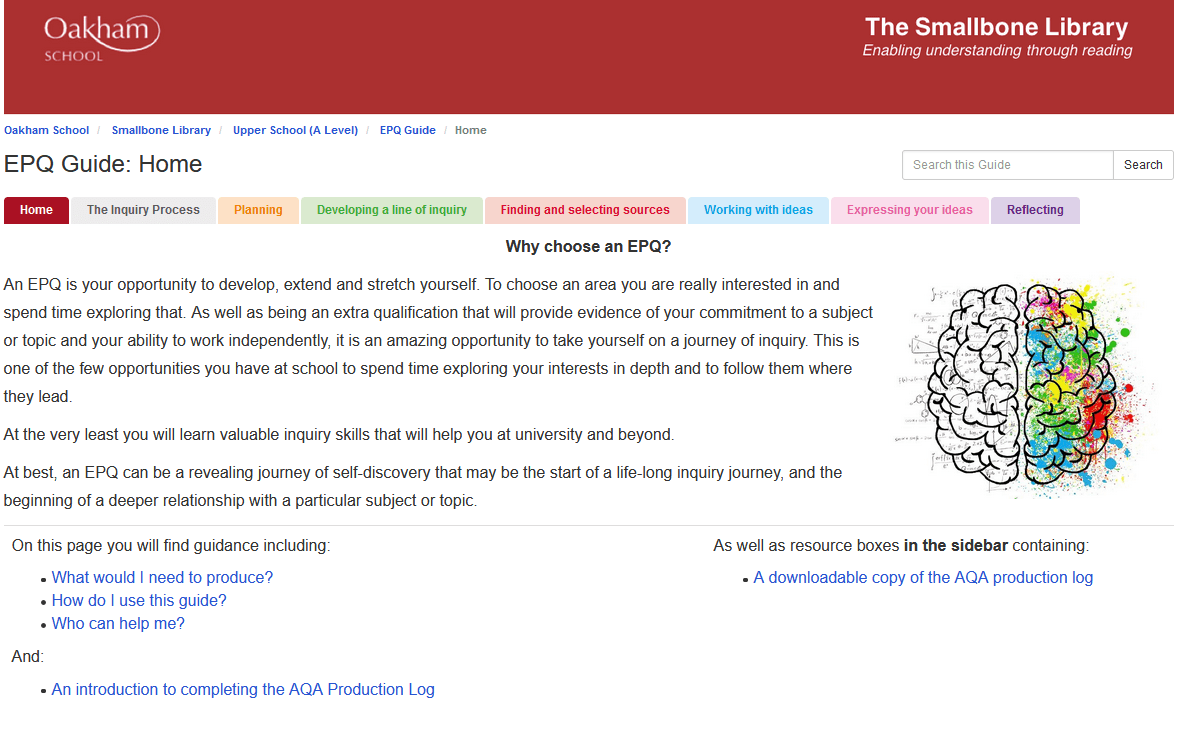
The guide also gives them links to other Library resources they might find useful, such as our guide to Recommended resources for Upper School and to Citing and Referencing in Word.
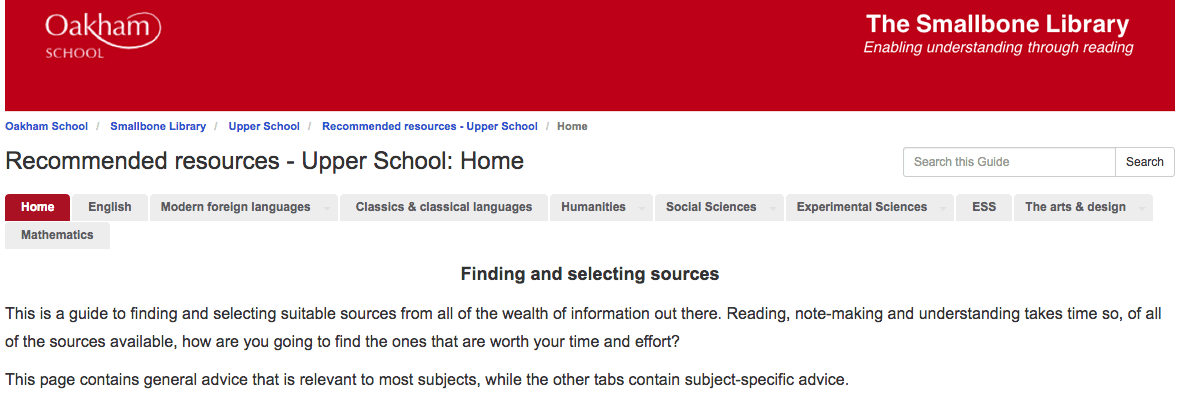
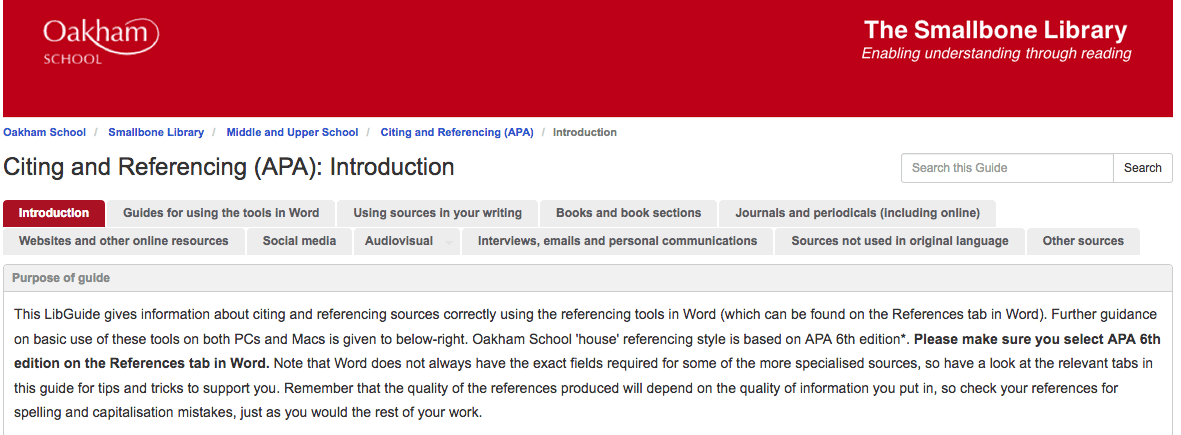
Something I have discovered as I have worked with our guides (and I would imagine this is very similar using other online platforms such as VLEs) is the importance of creating central guides/resource collections that are useful for large groups of students (e.g. in this case Upper School students) and then linking to them from other more subject/topic specific guides rather than dispersing that information throughout the system. This both saves lots of time because you aren’t always reinventing the wheel but also, critically, makes it easier to keep the resources up to date. It seems so obvious now, but when I started this journey I had a lot to learn about making a connected, easy to navigate and maintain online space (and I still have a long way to go!). It is very easy to focus too hard on making a site or collection as easy as possible for users to navigate OR as easy as possible for creators to maintain without considering both these needs together. And if I set something up in a hurry both these needs can go out of the window in favour of the immediate need to get something up quickly that does the job – and I always regret that later!
My involvement with EPQs has been very indirect compared with IB EEs and this EPQ guide is very much a first effort and will certainly evolve over time. All constructive criticism and advice welcome.
9th November 2021 at 11:26 pm #78464We moved schools (and countries) over the summer and are now at Blanchelande College on Guernsey. An exciting learning opportunity this move has brought is the chance to develop EPQ provision from two perspectives as I have been appointed both a Librarian and the EPQ Co-ordinator. Blanchelande is not an IB school so I am no longer involved with the Extended Essay, but the school has a very new sixth form so I have the opportunity to design the EPQ provision from scratch, building on my experiences with independent inquiry in the EE and with starting to support Chris with the EPQ at Oakham. I am very aware that the EPQ has some very significant differences in structure and delivery to the EE so have been reading and attending as much training as I can. AQA run some excellent free courses, but only allow one person to attend from each centre per exam session, so being a brand new co-ordinator it has made sense for me to attend.
I’m painfully aware that there is only so far that reading and courses can get me, so I’m going to post as much as I can of my journey here in the hope of drawing on the wisdom of those of you who already have considerable experience in supporting the EPQ as Librarians, Supervisors, Co-ordinators or some combination of all three. Here are some of my initial thoughts:
- Before I was appointed Co-ordinator I was trying to clarify the ‘triangle of support’ for the EPQ for our senior management (based partly on a similar diagram I produced for the Extended Essay). Diagram below. I would be very interested in any feedback. This is now complicated by the fact that I am both Librarian and Co-ordinator for Year 12, and Librarian, Co-ordinator and Supervisor for Year 13 (we have quite a small cohort), but it is important for me to understand the different roles. I was very encouraged to hear the AQA Chief Examiner telling both Co-ordinators and Supervisors on the courses I went on over the last two weeks how important Librarians are to the process and that they should be involved in the taught element.
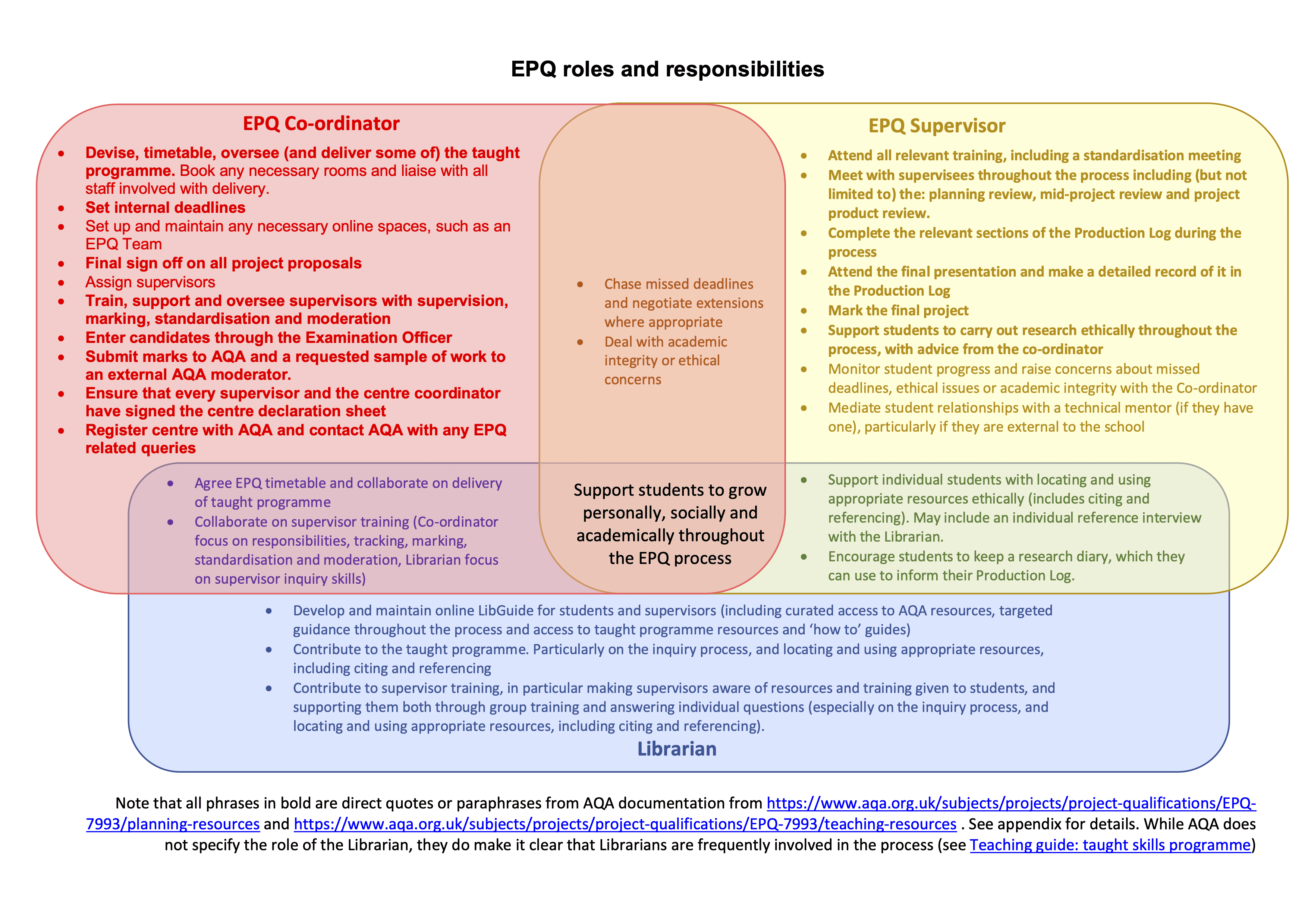
- In picking up the Year 13 students (our first EPQ cohort) who were all stuck at various stages, it struck me how important a deep understanding of inquiry is here and why the Librarian has an important role in the process. For example:
i. One student was still stuck in Connect. He had a wide range of interesting superficial stimulus resources (photographs) and was still in the process of finding more, but seemed unable to focus his interest on a topic that would be reasonable to cover in 5000 words and needed some support to focus. He needed support to Wonder about his images and generate suitable questions for futher exploration.
ii. A second student had a really good idea for a question but was struggling to find resources for the Investigate stage. Without giving him specific resources I pointed him towards banks of scholarly resources he could access and local library options to help him get unstuck.
iii. Another student was starting to write while she was still gathering resources (because she’s “not really a planner”….) and needed help to understand the importance of Constructing her ideas.
iv. A fourth student was stuck in a cycle of refining and refining her artefact based on feedback and had lost sight of the fact that she needed to put a time limit on this and begin to Express her research in her 1,000 word report.
Understanding which inquiry stage each student was stuck at both helped me to unstick them AND gave me ideas about how to plan the Year 12 course to pre-empt some of these issues next year. I’d love to hear where your students tend to get stuck and how you help them.
- I started delivering the 30 hour taught element of our course this week. Because it is optional for us it is off-timetable, so I checked with all the students who were interested and then put it on as a 1 hour a week after school activity, with the expectation that they then put in at least another hour a week of independent study themselves during term time, and 2 hours a week during holidays (to make up to the 90 hour independent study element). I am so excited about this because I have so much more (and more regular) contact with these EPQ students than I did with the EE students. I can genuinely design and run a hands on ‘taught course’ rather than needing to deliver this through 3 lecture style seminars and 2 workshops. It also feels like quite a responsibility though. In order to get started I had to rough out the whole course so that I know what I’ll need to get done by when and so that I can be clear with the students. First I came up with a general course outline (below – credit to AQA as this builds on and refines their process diagram), before beginning to produce a very rough week-by-week plan. What do others think? How does my proposed outline compare with what you do?
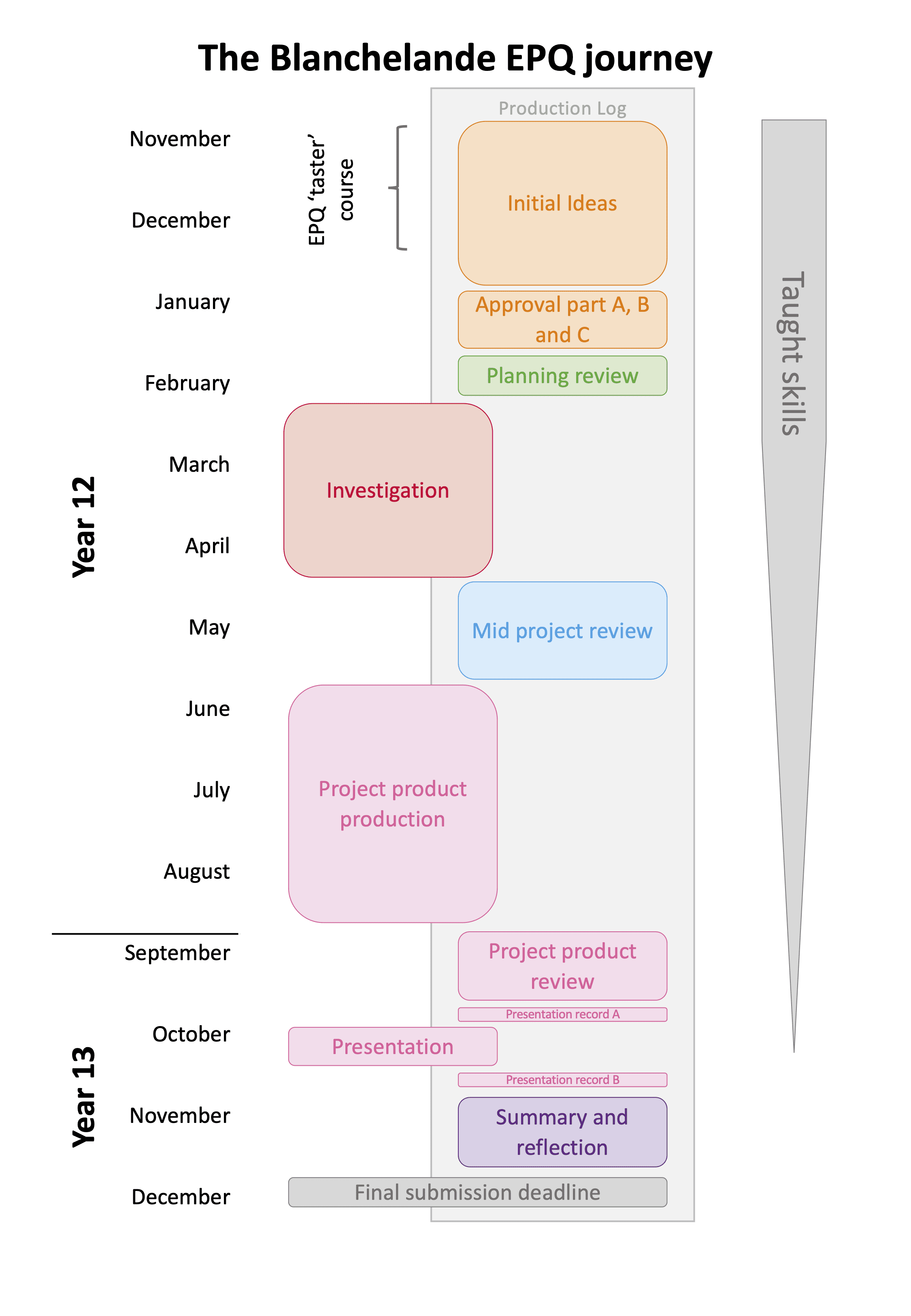
The introductory session with eight students went really well this week, and they began brainstorming ideas and interests to make a start towards a topic. I’m out of time this week, but will post how I’m getting on as I go along. Next week as well as the regular Year 12 activity I need to check in with Year 13 (as I’m supervising all 5 of them) AND I’ve got a ½ hour ‘lecture stye’ session with 50 Year 11s to introduce the idea of the EPQ to them as part of a sixth form taster day….. I’d love to hear any ideas for ‘activities’ that might work with groups of 50 in a hall as I don’t really want to just talk at them for half an hour, and I want them to come away really excited about the idea of an EPQ
Looking forward to hearing everyone’s thoughts!
Attachments:
29th November 2021 at 7:47 pm #78506Sixth form taster day
Darryl and I spoke to 55 Year 11 students for half an hour in the hall for the Sixth Form Taster Day. We started with one of the amazing “Shift Happens” YouTube videos that gave the statistic that “If you are one in a million in China there are 1,300 people just like you”* and used the hook throughout the talk that there is NO-ONE just like you and the EPQ gives a chance for your unique interests, ideas and approach to shine through. That fits really well with the AQA tag line “Be seen with an EPQ” because we talked about an EPQ allowing you to really be seen for who you are.

I gave students an A4 ‘booklet’ (printed double sided, flipping on short edge, and folded into 4. Word version. PDF version.) to take away and asked them at various intervals during the session to fill in:
- Things they like to talk to friends and family about
- Things they do in their spare time (could be hobbies, computer games, shows they watch)
- Things they really care about (could be causes, pets, hobbies…)
- Topics that interest them in subjects they are studying or are about to study
- Pathways they are considering taking in the future (could be university courses, A-level courses, careers)
This gave little ‘micro breaks’ where they had a chance to do something and weren’t just listening, but not long activities where I risked losing them as a group. There were some really animated conversations about their interests during these breaks and I felt they did a lot towards maintaining student enthusiasm and putting them at the centre of the EPQ picture. At the end I invited them to go away and consider links between these five areas of interest as they thought about what direction they might go in if they chose to do an EPQ.
The session went really well but the test will be what happens next year, both in terms of students who chose to return to the school for sixth form (which is very new, only in its second year) and of those who choses to do an EPQ. I have a great cohort of 5 Year 12 students and 5 Year 13 this year. What I am hoping for next year is to empower some of the less academically able who have a special interest area where they could really shine with an EPQ. I think the key here though is not to encourage students who are failing in other courses to take up an EPQ “for the UCAS points”, but to find those with a real passion for something that they can’t demonstrate through the conventional A-level routes.
It would be interesting to hear others’ approaches to EPQ marketing. Who do you present to and what do you say? I have been involved in 2 other EPQ events since taking over as co-ordinator in October – Year 11 choices evening and an assembly ‘recruitment pitch’ to Year 12 just prior to beginning the taught element. In February we will have the 5 Year 13 presentations in sixth form assembly, but my aim is that the upcoming Year 12 will present in the October of Year 13 in the run up to the new Year 12 deciding whether to opt for an EPQ.
(*actually this is an old number now, it should be 1447…but we used one of the older Shift Happens videos for historical context, because it has great music and because not all the updated ones include the “one in a million'”intro. Darryl did explain this to the students)
30th November 2021 at 11:31 am #78510Fabulous update Jenny. Thanks for sharing!
27th October 2022 at 4:32 pm #79242It’s been a very busy year since I first picked up the role of EPQ co-ordinator, and I realise I haven’t made the time to update you on my journey. Setting up a new course from scratch is quite a learning curve! We had our first results as a centre certified over the summer (for the group that I took over part-way through), and next week my first full-year cohort will do their presentations, submiting their projects the week after. I’ve been working on getting my ‘Medium Term Plan’ (essentially a set of unit overviews and a week-by-week scheme of work) into the school template for the Director of Studies in preparation for starting the whole process again with the new Year 12 cohort in a couple of weeks time. It has been a great opportunity to both reflect on the journey so far and to look ahead to refining the course next year (Departmental Action Plan is next on my list!).
Key opportunities over the year have been:
- a presentation to all Year 11 and parents in October at the Sixth Form Information Evening about the EPQ as they look ahead to their A-level choices (new this October)
- a session with all Year 11s in November and June as part of the Sixth Form Taster/Bridging days, and an opportunity to set bridging work over the summer for those who are potentially interested in an EPQ
- a six week inquiry course for all Year 12 over September and October to develop key inquiry skills and mindset that they will all need for the sixth form, regardless of whether they take an EPQ
- all Year 12 and their parents (and interested Year 11) will attend this year’s Year 13 EPQ presentations (on the same evening that Year 12 present the fruit of their own inquiry course – more on that elsewhere), just before Year 12 apply for their places on this year’s EPQ course.
These developments mean that the incoming Year 12 will have a much better idea of exactly what the EPQ involves before they start, will have had considerable time to mull over potential topics, and will also have had a boost in key inquiry skills (particularly, but not limited to: developing good questions, basic database searching, CRAAP testing and basic citing and referencing) before the formal EPQ taught course begins. Given the necessity of front loading the taught course in order for students to be able to begin choosing a topic and start background research as soon as possible, all these developments are really helpful. Particularly as the time for our taught course is spread evenly over our EPQ year (1 hour a week for just over 30 school weeks from November to November).
I’ve done a bit of rejigging of my original teaching plan – focussing on skills needed for locating background resources earlier and looking at what makes a good question later, for example. Connect before Wonder! Last year I regarded resource location as an Investgate skill so, although I did touch on it briefly early on I didn’t really focus on it until later. I think it would help my students to be better at locating resources earlier on. The school unit template (which every subject uses) has also been really helpful because it encouraged me to think about Entry Questions and Topical and Overarching Essential Questions for each unit. Quite a mind-bender in some ways for a course that is entirely skills based with no content as such (because students determine their own content) but actually very useful in crystalising what the purpose of each unit actually is. All subjects in our school have to list key FOSIL skills for each unit in their unit plans, and for me it was an opportunity to revist the FOSIL Skills Framework to check I was covering everything we should be expecting of Year 12 and 13.
I share my Medium Term Plan here with the same caveat I always give – it is very much a work in progress (in just its second year) and I expect it to evolve considerably in the future. Part of our radical commitment to sharing in this group is to share works in progress so that we can learn from and with each other. I’m sure their are many of you who are more experienced with the EPQ who can offer me some good advice! Note that the first 14 pages are the overarching Unit Plans (see image below. Download Word version here):
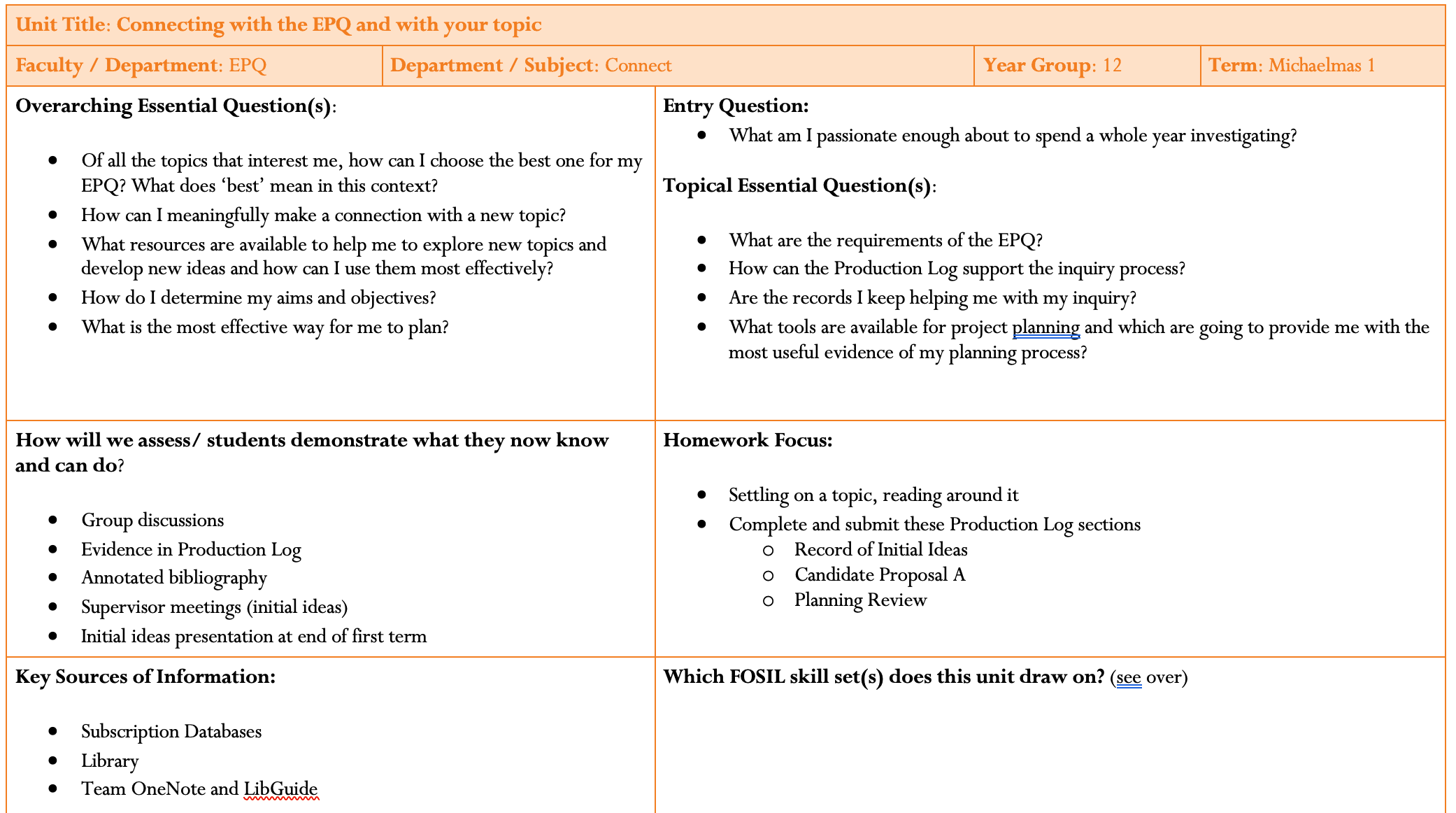
While pages 15-19 are essentially the Scheme of Work (see image below. Download Word version here):
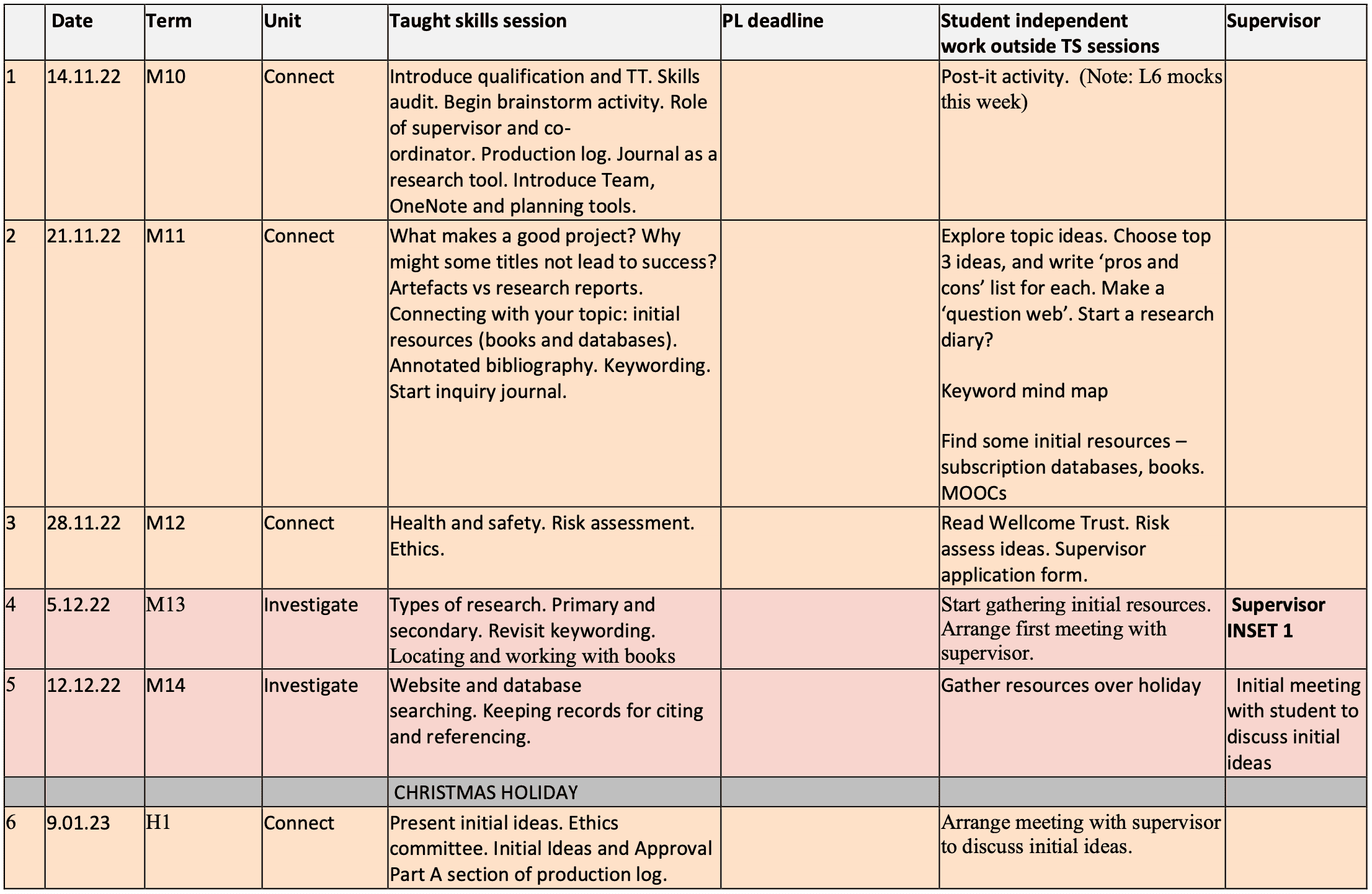
I would love to hear what others are doing, and to hear comments and suggestions on what I could improve in my taught course. I have so much I want to do, it’s hard to know where to begin! One of my plans this year is to get a LibGuide up and running for the course (we just used a Team with an integrated OneNote last year, but I think a LibGuide alongside those would work better than just posting resources in the Team OneNote). I also want to get students experimenting early on with time management tools – either simple ones such as the To-Do lists in Outlook or some of the more complex online options (I found an interesting list here but need to explore it further to see which might be worth recommending – if anyone has experience with any of these tools I’d be very interested. I’m quite interested in Todoist and ClickUp, at a quick glance, but have no experience with either). I’m convinced that most of my students are more likely to monitor their progress against their planning if their intial planning was in an interactive tool, where they could easily tick off tasks and adjust deadlines, than if they initially planned on paper.
-
AuthorPosts
- You must be logged in to reply to this topic.


